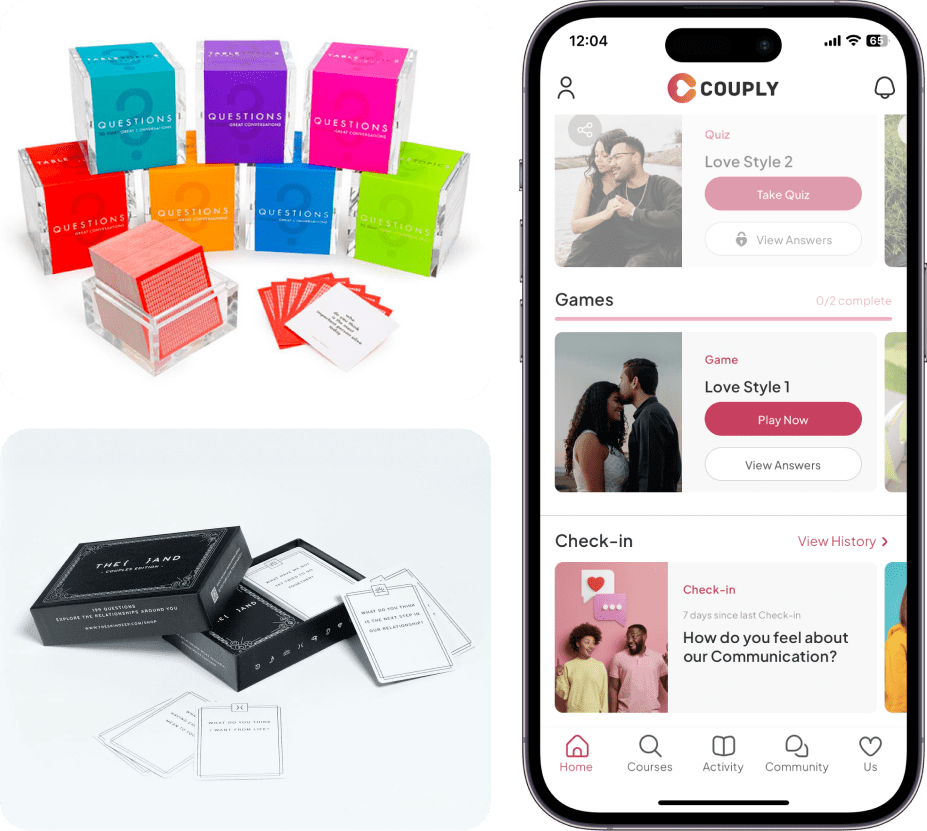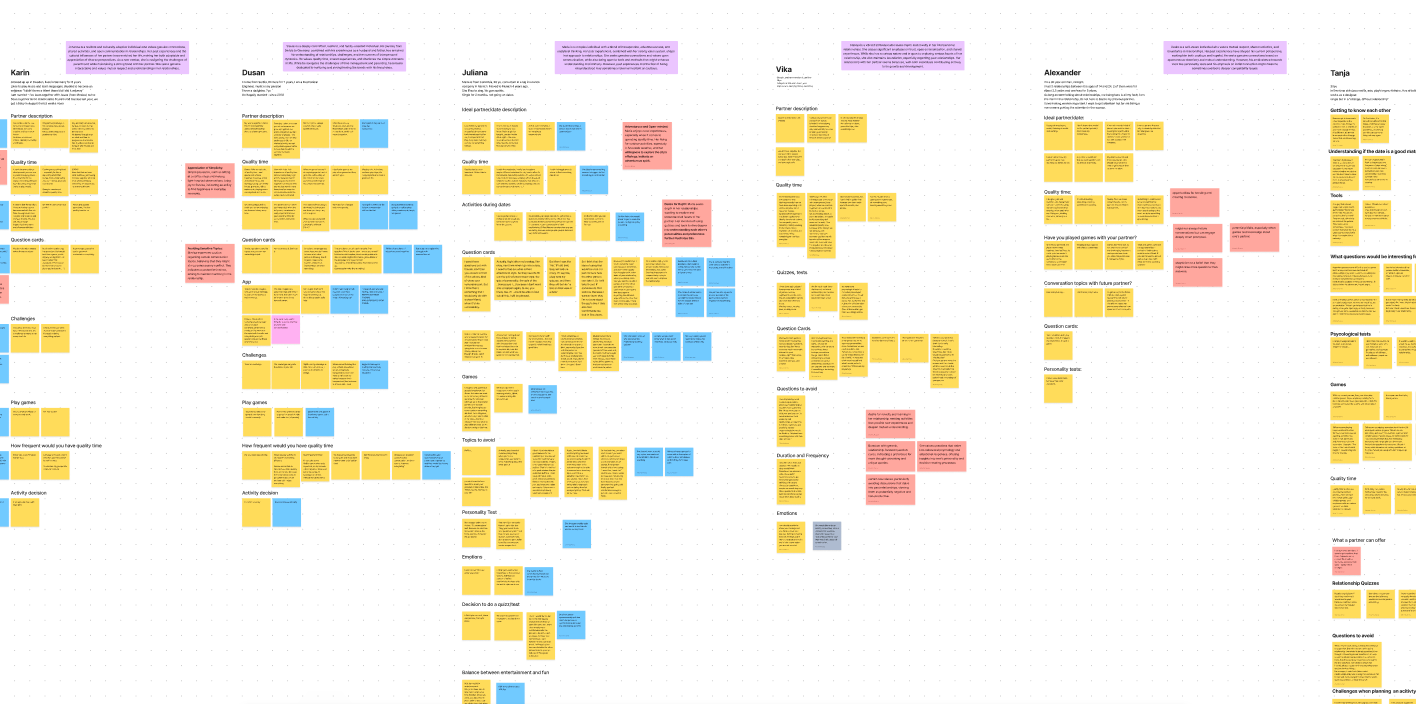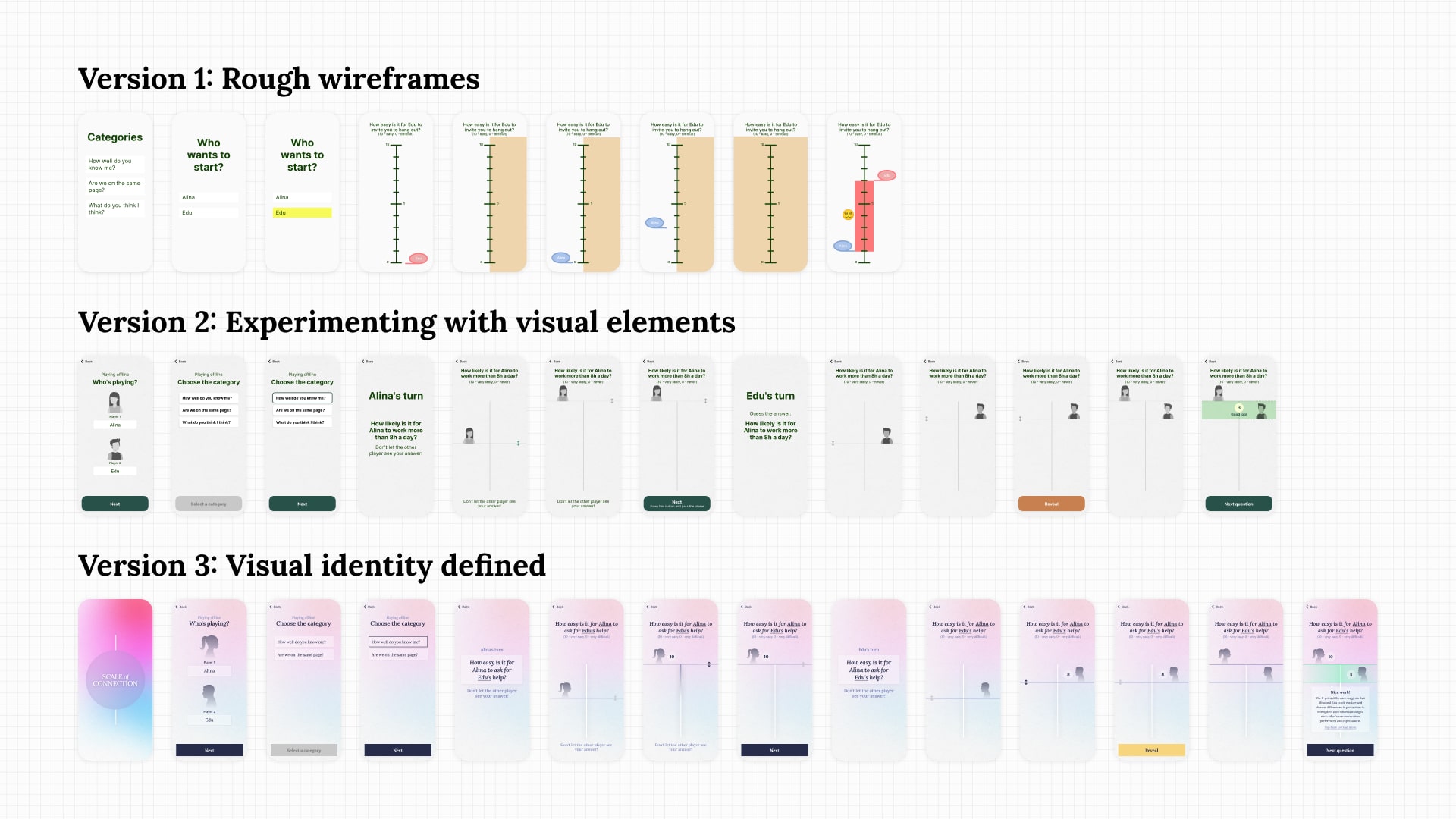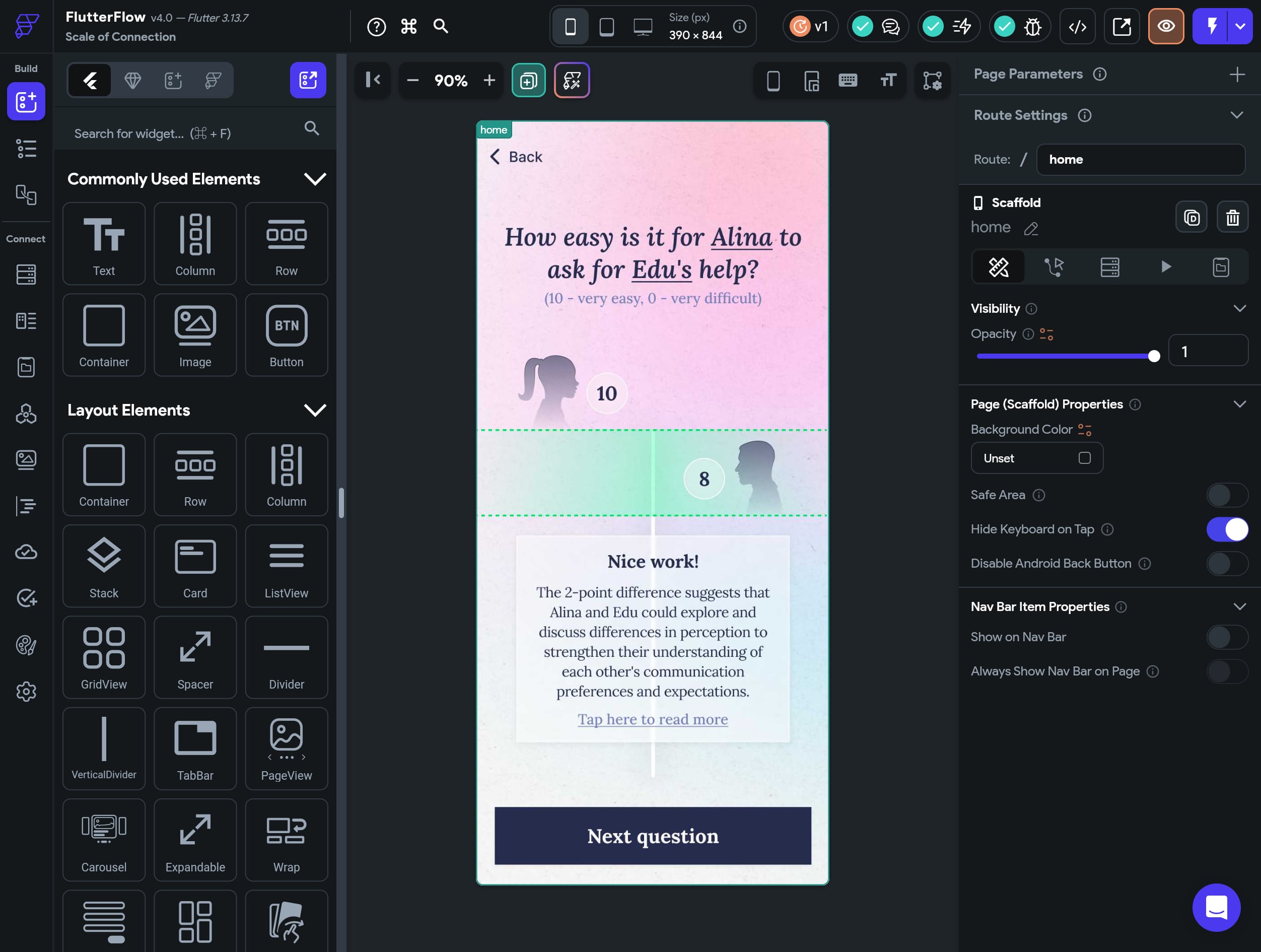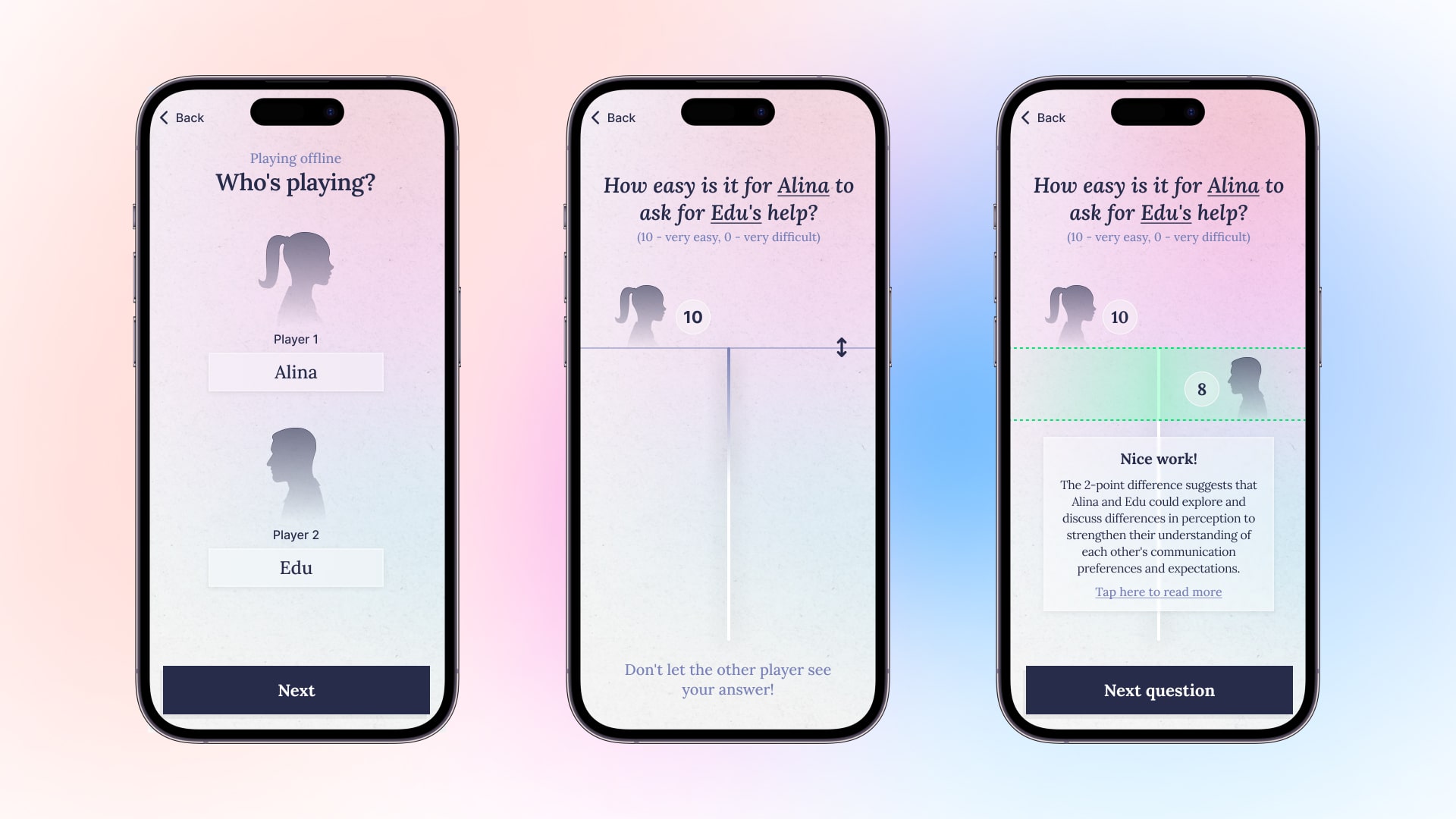The game for communication
Scale of Connection combines psychology, entertainment, and self-reflection to create meaningful and fun interactions between two people.
Aimed at couples, the rules are simple:
- Players choose a category: “How well do you know me” or “Are we on the same page”
- Individually, each player will answer with a rating from 0 to 10
- The ratings are revealed along with an AI-powered insight and assessment from a GPT specialist in couple therapy. The couple discusses the topic with their perspectives.
The app is result of 6 weeks of research, design and testing. People demonstrated a lot of enthusiasm for the game, pointing that it made a significant difference in improving communication while having fun.
Public launch is scheduled for December 2023.
The beginning
This article about communication in relationships (How to communicate in a relationship, according to experts), made me reflect about how hard it can be to build and maintain meaningful relationships today, whether in dating or with friends and family.
After playing a few games with my partner, I got curious about experimenting in creating a tool or game for that, since effective communication is crucial in these connections.

Desk Research
In-depth analysis of physical and digital games, such as Table Topics, The Ultimate Game for Couples and quiz apps like How Well Do You Know Me and Couply, revealed a key insight:
Couples highly value engaging conversations and meaningful interactions.
This finding inspired the development of an activity aimed at fostering deep, meaningful conversations to strengthen relationship bonds.
- Understanding possible attitudes toward quality time and games for couples.
- Understand general attitude towards apps for couples.
- Discover what apps or activities people currently use.
- Identify desired features in games or apps for relationship building.
- Gauge the level of commitment couples are willing to invest in a relationship-building game.
- Understand the balance couples want between fun and serious elements in a relationship game.
- How do people define quality time with another person?
- How do people spend quality time with their significant other?
- What is the attitude towards games/quizzes during quality time?
- What is the attitude towards games/quizzes for relationship building/getting to know each other?
- What is the attitude towards using apps for quality time/relationship building?
- What games, apps, and activities do people use during quality time?
- What barriers do users identify when planning quality time?
- What barriers do users face when trying to strengthen their relationships?
- What barriers do users identify with their activities during their quality time
- What emotions or experiences do couples hope to achieve or avoid in a game setting?
- How much time are couples willing to commit to playing a relationship-building game?
- Do couples prefer a balance of fun and serious elements in a relationship-building game or lean more towards one?
- Are there specific topics or questions couples would like to avoid in such games?
- In which settings do people play such games?
- How do couples feel about integrating real-world activities or challenges as part of the game?
- What is the ideal frequency of game sessions for relationship-building (daily, weekly, monthly)?
- Thank the participants for their time.
- Briefly introduce the purpose of the interview: “I am doing research to understand couples’ preferences and attitudes towards games and activities that can strengthen relationships”
- Assure confidentiality: “Your responses will be kept anonymous, and any identifiable information will be kept strictly confidential”
- Ask for consent to record (if recording): “Would it be okay if we record our conversation so that I can transcribe it later?”
- Could you please tell me a little bit about yourself?
- Could you tell me a bit about your relationship status and how would you describe your relationship?
- What are your and your partner’s hobbies?
- How would you describe your partner?
- How do you define having quality time with your partner?
- What activities or events come to mind when you think of quality time?
- How would your perfect quality time look like? (any specific activities?) WHY
- How do you spend quality time with your SO?
- (If the participants say they go to a restaurant, etc. I can ask what their conversation looks like and what topics they choose to discuss, if any?)
- How important is having a conversation during the quality time? Why?
- How do you feel about using games, quizzes, and question cards as a way to spend quality time with your SO?
- Have you ever used games, quizzes, and question cards to strengthen the relationship or (get to know each other better)?
- If yes, what kind of activities are they?
- What is your general attitude towards question cards to spark conversation or reflect on your relationship?
- If yes, how did you decide to play a game/quiz/question cards?
- App Use and Preferences:
- Do you currently use any apps for spending quality time or to strengthen relationships? If yes, which ones?
- How would you feel about using an app designed for couples’ quality time and relationship enhancement?
- What challenges do you face when trying to plan or spend quality time with your partner?
- Are there any barriers or challenges you’ve encountered with games, apps, or activities meant for couples?
- What emotions are you hoping to feel when playing a game or using an app with your partner?
- Are there any specific emotions or experiences you’d want to avoid in such a setting?
- How much time are you willing to commit to playing a relationship-building game?
- What do you think is the ideal frequency for game sessions aimed at relationship-building (e.g., daily, weekly, monthly)?
- Fun and serious elements in a relationship-building game – which one would yu choose and why?
- Are there specific topics or questions you would prefer to avoid in such games?
- How do you feel about games that integrate real-world activities or challenges?
- Would you be open to sharing your game outcomes or progress with friends, professionals, like relationship counselors, if it could benefit your relationship?
- Ask if they have any other thoughts, experiences, or suggestions to share that haven’t been covered.
- Thank them for their time and insights.
- Inform them about the next steps in the research and if/how they’ll be informed about the results or outcomes.
Target Group
Married couples with kids and single individuals seeking to enhance connections in their relationships.
Participants
A total of 9 participants were recruited for the user research, representing a mix of relationship statuses and backgrounds.


1. Mature couples often avoid tough topics
In long-term relationships, people usually stay away from topics that might cause arguments. They choose to accept differences rather than risk upsetting each other.
2. To check if it's a match, some are curious, others are spontaneous
When dating, some singles like to ask questions early on to see if they’re a good match, while others rely on “the chemistry”. The curious ones worry about asking too much, but they want to avoid surprises later.
3. People prefer meaningful interactions over small talk during quality time
Couples enjoy deep, interesting talks more than just chatting about everyday things. These conversations are about situations and decisions, which help them understand each other better.
4. It's hard for some to talk about what they want in a relationship
Many people find it tough to tell their partner what they expect from the relationship. They’re often scared of being too open, how the other person might react, or that the answer will disappoint them.
5. Balance of seriousness and fun is the key for adoption of relationship games
While some couples were open for tools and guides, others are skeptical because they either see the use tools as an extreme measure or games too silly – funnily enough, when it comes to intimate moments, couples agree they desire more fun.
6. Using real-life situations in games makes them more interesting
Adding real-life events and situations to relationship games makes them more relevant and fun. This way, the games reflect real challenges and choices people face.
7. Quality time together means positive, bonding moments
Spending quality time together is important for feeling close and happy. It’s all about enjoying each other’s company and feeling comfortable sharing thoughts and feelings.
8. People have mixed feelings about relationship quizzes
Some like using quizzes and tests in their relationship, but others are worried. They fear these tools might bring up difficult questions or doubts, so they’re cautious about using them.
Ideation
Users gave me insights that the game for couples should: Achieve a delicate balance between depth and entertainment, handle sensitive topics with extreme care, oromote meaningful interactions instead of superficial conversations, have get-to-know-each-other compatibility questions for early dating, foster open communication while respecting individual comfort levels, include a combination of situational and relationship questions and provide the option to choose from various topics to avoid discussing subjects that couples may be unwilling to address.
With that in mind, after a few ideation sessions I came up with 3 concepts to test.

A. Partner Knowledge Challenge
A quiz game where you first answer questions about yourself, and then your partner tries to match your answers. The score shows how well your partner knows you. It’s fun and helps you learn more about each other.

B. Scale of Connection
In this game, both players answer the same question, rating it on a scale of 1 to 10 without showing the other. Then, they reveal their answers and discuss why they chose different ratings. It’s a way to understand each other’s thoughts and feelings better.
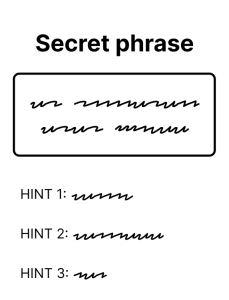
C. Secret Phrase
Each player writes a secret phrase related to a chosen category and gives hints for the other to guess. They take turns asking yes/no questions and using hints to guess the phrase. It’s a game that helps couples learn more about each other’s experiences and views.
Prototyping
I conducted prototyping sessions with 3 objectives: Validate the logic of the games, determine which concept resonated the most and validate whether the games address user needs.
To validate ideas as soon as possible, I developed paper prototypes of each concept and tested them with the recruited participants.
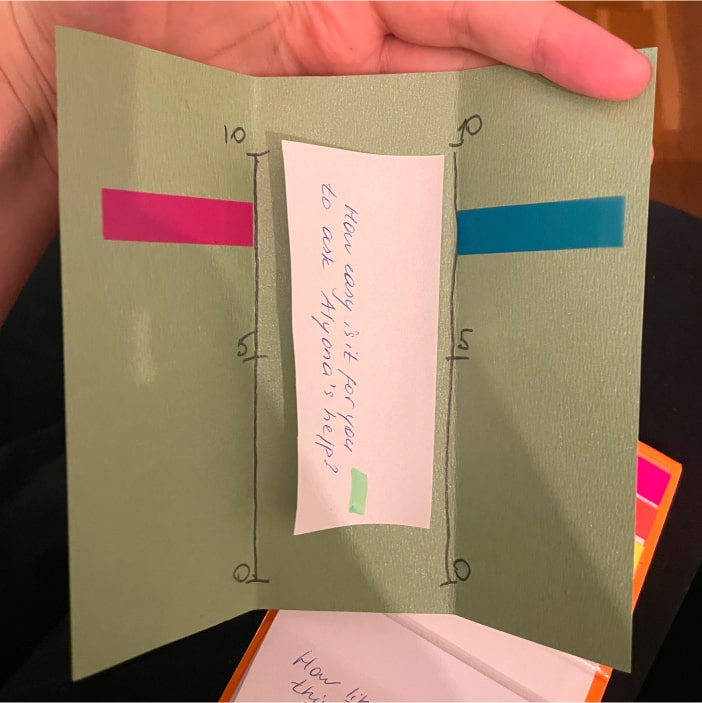
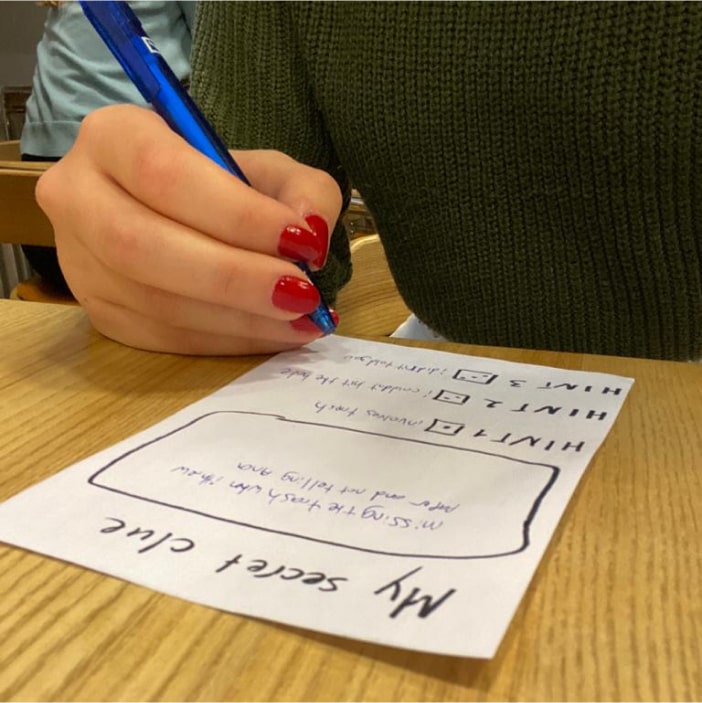
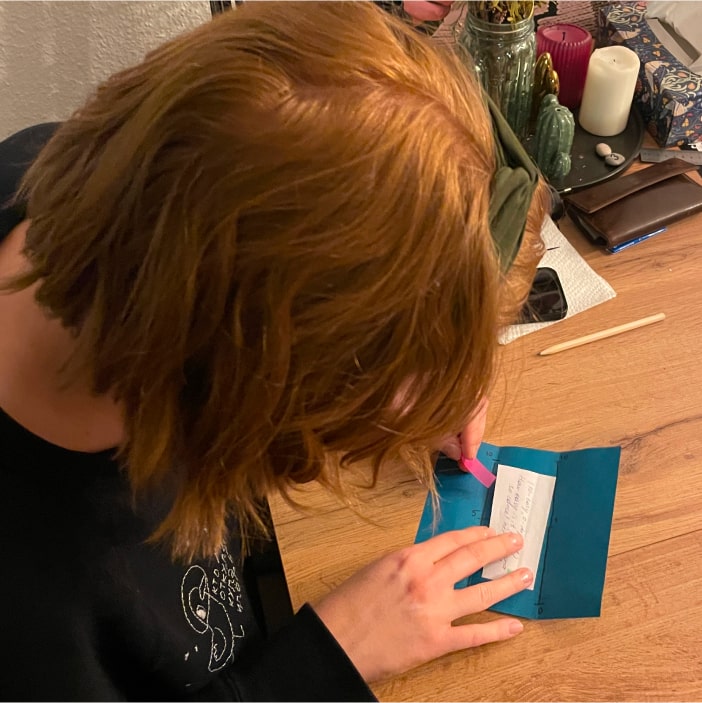
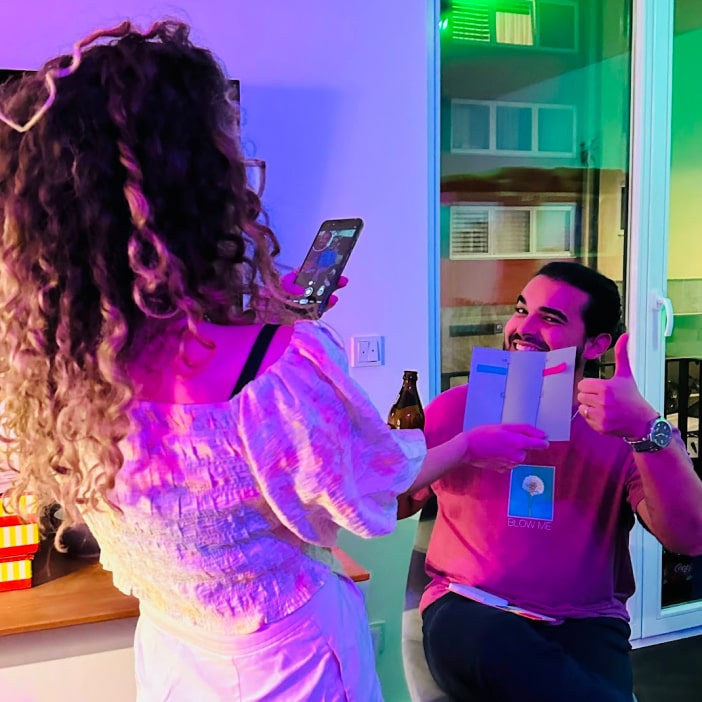
Takeaways
During testing, the “Scale of Connection” game was the favorite. It’s easy to play and helps people understand each other better by guessing how they rate different things on a scale. Players liked it because it wasn’t just about knowing facts but understanding feelings and opinions.
The “Secret Phrase” game was fun but a bit confusing. People had trouble making good clues and the yes/no questions didn’t always work well. It was hard to guess the right answers.
The “Partner Knowledge Challenge” wasn’t as popular. It focused on simple things like favorite colors, which players didn’t think were important for a strong relationship. Maybe if the questions and options were more personalized, it would have better acceptance.
Scale of Connection stood out for being simple, fun, and good for talking about more meaningful stuff in relationships.
Designing
In the design phase, I created wireframes for the game. The first was a basic layout to get the structure right. The second iteration improved usability, making things clearer and easier to interact with. Finally, the third version polished the design, focusing on better graphics and smoother navigation, turning the game into an appealing and enjoyable experience. This step-by-step process ensured the game was both user-friendly and fun to play.
Implementing
Generative AI
With the quick development of Generative AI since last year, it has become more practical to develop hyper-personal products and have the knowledge of experts at ease. It is no different for Scale of Connection, where GPT helps with:
- Feedback for couples with AI-powered advices on how to discuss and approach topics
- Custom-tailored questions according to the couples’ history
Next steps
- Reaching experts and Community building: The development of the game should be followed closely by an subject matter expert partner. Participating and creating communities of people interested in playing and supporting the game is a good strategy for growth-hacking that we are considering
- Online modes: Allow players to play on their own devices, especially useful for long-distance relationships
- Multiplayer mode: Broadening the dynamic for more players to join the game
- More categories: How well do you know me (understanding specific aspects of each other’s lives or feelings), Situational questions, Are we on the same page? (assess certain aspects of their relationships), Spicy questions (assess their willingness to trying new experiences).

